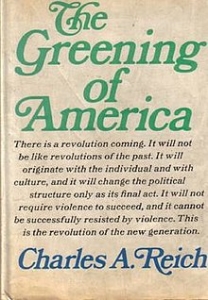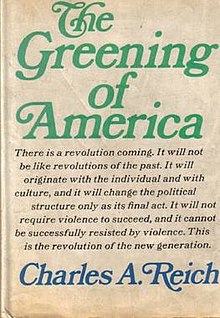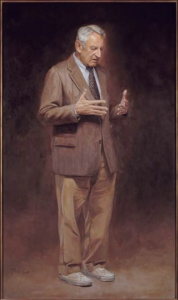Charles Reich’s The Greening of America
 When Random House first published Charles Reich’s The Greening of America in 1970, they thought so little of the radical manuscript that just 5,000 copies were printed. The New Yorker followed the book’s publication with the longest excerpt in the magazine’s history, prodding the publisher to issue a dozen reprints—eventually selling some 2 million copies. The debate about American political culture the book unleashed has been compared to the impacts of Rachel Carson’s Silent Spring and the Kinsey Report upon environmental thinking and the sexual revolution, respectively.
When Random House first published Charles Reich’s The Greening of America in 1970, they thought so little of the radical manuscript that just 5,000 copies were printed. The New Yorker followed the book’s publication with the longest excerpt in the magazine’s history, prodding the publisher to issue a dozen reprints—eventually selling some 2 million copies. The debate about American political culture the book unleashed has been compared to the impacts of Rachel Carson’s Silent Spring and the Kinsey Report upon environmental thinking and the sexual revolution, respectively.
For me Greening had a substantial impact midway in my transition from a Goldwater conservative to a democratic socialist. I first read the book in either 1970 or 1971, and I recall feeling that I shared Reich’s assessment of the principal strains of American political culture. Re-reading it this fall, I discovered the book to be surprisingly, if simplistically, current. Popular American political culture today still resembles Reich’s Consciousness I—an expressed preference for small government, individual rights and free enterprise. Like Reich, I believe this Jeffersonian consciousness might have been appropriate for a nineteenth century society of small towns, face-to-face relationships and individual economic enterprise; but even by 1970, this ideal had long since failed to fit the complex, interdependent, highly organized cultural and political landscape we actually lived in.
By the second half of the 20th century, Reich concluded the beliefs of Consciousness I were drastically at variance with reality. Virtually unfettered individual rights, small government and unregulated free enterprise had been increasingly restricted by the growth of cities, large corporations, and bureaucracies. A new catechism had by then grown up around the organized technological and corporate society of the New Deal. This Consciousness II underlay an America where organization predominates, and the individual must make his way through a world directed by others. Consciousness II, according to Reich, “ultimately believes that individuals have no existence apart from their work [for an organization] and their relationship to society…The richness, the satisfactions, the joy of life are to be found in power, success, status, acceptance, popularity, achievements, rewards, excellence and the rational, competent mind.” Consciousness I may have continued (and still continues) to describe our aspirations (just listen to the presentation of the most recent conservative nominee to the US Supreme Court), but the levers of power are wielded by elites with far different objectives than individual liberty and maximum distribution of property. The result, according to Reich, is a society guided by a consciousness that is far removed from the realities of human needs.
This much of Reich’s analysis—that our nominal beliefs in free enterprise and individual liberty have been overwhelmed by the transfer of power from the man in the street to elites with degrees from Yale Law and Harvard Business School–could be a 2016 treatise emanating from “Occupy Wall Street” or the Bernie Sanders campaign.
But Reich’s conclusion—that a revolution led by the youth of the 1970s was inextricably leading to the overturning of the no longer relevant Consciousness I and of the dehumanization of Consciousness II—was purely wishful thinking in 1970; and it is no less wishful in 2019. Our hip generation (specifically led by the college Class of ’69) would preside, said Reich, over a revolutionary transition into a new age of American justice, fairness, ethical work. Conscious III sees, “with an astounding clarity that no ideology could provide, a society that is unjust to its poor and its minorities, is run for the benefit of a privileged few, is lacking in its proclaimed democracy and liberty, is artificial, harmful to the environment and self, and, like the wars it spawns, unhealthy for children and other living things.” Not only all this, but Reich asserted that nothing will stop the eventual ascension of this youth-led peaceful revolution; nothing will stop the power of this new consciousness.
Fifty years later, there has been no such peaceful revolution in American political culture. I am afraid the result of the deeply degrading dominance of Consciousness II has been much more accurately foreshadowed by recent works by Madeleine Albright (Fascism: A Warning) and Yale History professor Timothy Snyder (The Road to Unfreedom). But that’s a discussion for another day.



Hear, hear! Our generation went down the rabbit hole of Consciousness II and never came out.
Thanks for reminding me. Today I think the lesson of that book is that if you hang around too much with college students and graduate students, you end up thinking like them.
Interesting, Jeff. Having spent 20 years teaching college students, I agree with you. Or at least I’d like to think I did somewhat.
Yes, Charlie had me, and he still does. I can count the ways we have changed, as well as not changed things: environmentalism, norms of racism (in process, stay tuned), to name two. Certainly, he changed my own perceptions, and for guys in positions of power, like Betts or Woodlock, I wonder what the report would be about the direction for the long haul. Predictions are vulnerable to the fallacies of ideology or utopia, but they often contain a kernel of insight.